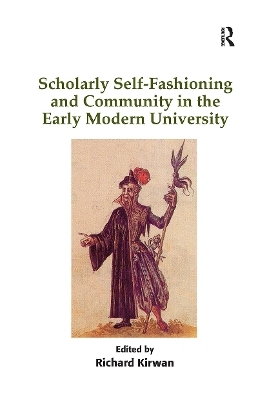
Scholarly Self-Fashioning and Community in the Early Modern University
Routledge (Verlag)
978-1-032-92627-8 (ISBN)
A greater fluidity in social relations and hierarchies was experienced across Europe in the early modern period, a consequence of the major political and religious upheavals of the sixteenth and seventeenth centuries. At the same time, the universities of Europe became increasingly orientated towards serving the territorial state, guided by a humanistic approach to learning which stressed its social and political utility. It was in these contexts that the notion of the scholar as a distinct social category gained a foothold and the status of the scholarly group as a social elite was firmly established. University scholars demonstrated a great energy when characterizing themselves socially as learned men. This book investigates the significance and implications of academic self-fashioning throughout Europe in the early modern period. It describes a general and growing deliberation in the fashioning of individual, communal and categorical academic identity in this period. It explores the reasons for this growing self-consciousness among scholars, and the effects of its expression - social and political, desired and real.
Richard Kirwan is a Lecturer in History at the University of Limerick. His main research interests lie in the social and cultural history of early modern universities, early modern elites, and print culture. His first monograph, Empowerment and Representation at the University in Early Modern Germany: Helmstedt and Würzburg, 1576-1634, was published by Harrassowitz in Kommission in 2009.
Introduction Scholarly Self-Fashioning and the Cultural History of Universities, Richard Kirwan; Chapter 1 The Ideal Student: Manuals of Student Behaviour in Early Modern Italy, Jonathan Davies; Chapter 2 Academic Exchanges: Letters, the Reformation and Scholarly Self-Fashioning, Kenneth Austin; Chapter 3 Johannes Eck (1486–1543): Academic Career and Self-Fashioning around 1500, Ingo Trüter; Chapter 4 From Individual to Archetype: Occasional Texts and the Performance of Scholarly Identity in Early Modern Germany, Richard Kirwan; Chapter 5 A Struggle for Nobility: ‘Nobilitas literaria’ as Academic Self-Fashioning in Early Modern Germany, Marian Füssel; Chapter 6 The Social Metaphysics of Professors: Divine Providence, Academic Charisma and Witchcraft, Andreas Corcoran; Chapter 7 The Idolater John Owen? Linguistic Hegemony in Cromwell’s Oxford, Gráinne McLaughlin; Chapter 8 Irish Student Identity at the University of Paris: A Case Study, Jason Harris;
| Erscheinungsdatum | 16.10.2024 |
|---|---|
| Verlagsort | London |
| Sprache | englisch |
| Maße | 156 x 234 mm |
| Gewicht | 426 g |
| Themenwelt | Geisteswissenschaften ► Archäologie |
| Geisteswissenschaften ► Geschichte ► Allgemeine Geschichte | |
| ISBN-10 | 1-032-92627-9 / 1032926279 |
| ISBN-13 | 978-1-032-92627-8 / 9781032926278 |
| Zustand | Neuware |
| Informationen gemäß Produktsicherheitsverordnung (GPSR) | |
| Haben Sie eine Frage zum Produkt? |
aus dem Bereich


